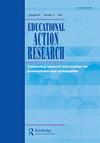Using cooperative learning strategy to increase undergraduate students’ engagement and performance
IF 1.2
Q3 EDUCATION & EDUCATIONAL RESEARCH
引用次数: 0
Abstract
ABSTRACT In the 21st century, preparing university students for real work and lifelong learning requires instructors to serve as facilitators of learning rather than as providers of information. Instruction needs to be learner-centered, active, enjoyable, and engaging. As one form of active learning strategy, cooperative learning (e.g. group assignment) helps students to collaborate in tasks actively, and this in turn improves their learning and performance. However, in my undergraduate course, when I encourage students to do assignments in groups, many of them do not take it seriously and, as a result, the final product is in terms of quality and participation. The objective of this action research was to improve the educative value of group assignment as one form of cooperative learning by way of designing the task thoughtfully, following up and motivating students, providing constructive and timely feedback, and ensuring greater student engagement in the task. Third year psychology students were enrolled for the project, and two phase actions were implemented: preliminary and actual action implementation. The outcomes of the preliminary and actual action implementation were then compared. The findings revealed that, as a result of the intervention, students changed their attitudes towards group assignment and were more engaged in the second assignment than the first (t = 6.51, p = 0.05). Students’ performance in the second test and group project also increased (t = 2.80, p = 0.05 and t = 7.67, p = 0.05 respectively). Based on the findings, implications for future research and action are suggested.运用合作学习策略提高本科生的参与度和表现
本文章由计算机程序翻译,如有差异,请以英文原文为准。
求助全文
约1分钟内获得全文
求助全文
来源期刊

Educational Action Research
EDUCATION & EDUCATIONAL RESEARCH-
CiteScore
3.10
自引率
8.30%
发文量
48
期刊介绍:
Educational Action Research is concerned with exploring the dialogue between research and practice in educational settings. The considerable increase in interest in action research in recent years has been accompanied by the development of a number of different approaches: for example, to promote reflective practice; professional development; empowerment; understanding of tacit professional knowledge; curriculum development; individual, institutional and community change; and development of democratic management and administration. Proponents of all these share the common aim of ending the dislocation of research from practice, an aim which links them with those involved in participatory research and action inquiry. This journal publishes accounts of a range of action research and related studies, in education and across the professions, with the aim of making their outcomes widely available and exemplifying the variety of possible styles of reporting. It aims to establish and maintain a review of the literature of action research. It also provides a forum for dialogue on the methodological and epistemological issues, enabling different approaches to be subjected to critical reflection and analysis. The impetus for Educational Action Research came from CARN, the Collaborative Action Research Network, and since its foundation in 1992, EAR has been important in extending and strengthening this international network.
 求助内容:
求助内容: 应助结果提醒方式:
应助结果提醒方式:


